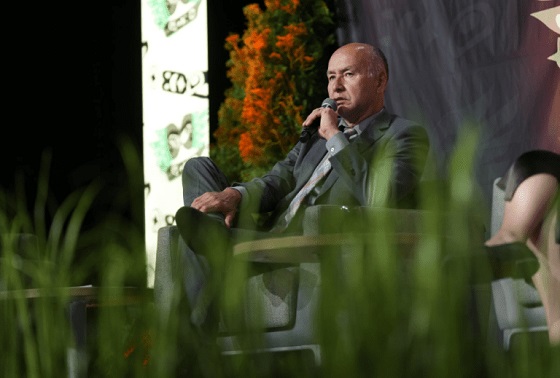Energy
‘Anti-human’: Tucker Carlson, Michael Shellenberger blast John Kerry’s COP28 speech

From LifeSiteNews
‘I think it’s fair to call it a death cult at this point, when you’re stifling energy supplies that are necessary to keep people alive, allow poor people to escape the use of wood and dung, I don’t know what else you call it than an anti-human death cult,’ Shellenberger told Carlson.
American conservative firebrand Tucker Carlson and journalist Michael Shellenberger recently blasted Democratic climate czar John Kerry for giving an “anti-human” speech at this year’s United Nations COP28 “climate change” conference.
Making the strong statements during the Monday edition of his X (formerly Twitter) show, Carlson played a clip of Kerry, who serves as U.S. special presidential envoy for climate, explaining at the COP28 conference in Expo City, Dubai on Sunday that he sees the global elimination of coal-fired power plants as an essential measure in tackling so-called “climate change.”
Ep. 44 Another half-demented 80-year-old yelling about things he doesn’t understand. These are our leaders. They don’t care about our future because they don’t have one of their own. pic.twitter.com/iylpXALJjZ
— Tucker Carlson (@TuckerCarlson) December 4, 2023
Calling Kerry and many in U.S. President Joe Biden’s administration “half-demented 80-year-olds,” Carlson pointed out that despite the pleas of Kerry and others like him, other nations are moving full-stream ahead with the burning of coal as a means of powering their countries, and thereby sustaining their populations and economies.
“China, for example, burns more coal each year than the rest of the world combined… this year, the Chinese have generated 14 percent more electricity from coal than they did last year; same thing in India,” Carlson said, adding that other large nations such as Indonesia have also ramped up their use of coal.
Carlson argued that this presents a hypocrisy among the Biden administration, which often talks about “climate change” and the purported role of the West in the creation of the so-called crisis while ignoring the behavior of China, India and other nations.
Continuing his show, Carlson interviewed journalist Michael Shellenberger about the behavior of Kerry and other members of the political establishment, inquiring what he sees as the true motivation behind the climate “religion.”
Shellenberger replied by accusing the global “elite” of having an outright hatred for humanity, pointing to the fact that politicians, including the British prime minister, took private jets to the recent U.N. conference in Dubai, all the while increasing energy costs for ordinary citizens and harping on the need for their citizens to reduce energy consumption.
“I think that what’s so different now is that the elites are just openly and blatantly expressing their hatred of humankind, particularly the hatred of working people, of poor people,” Shellenberger told Carlson “the obvious alternative to coal is natural gas… if this was actually about ‘climate change’ you would just produce more natural gas because it produces half the carbon emissions of coal.”
“But John Kerry and other climate activists are against natural gas,” Shellenberger continued. “And they have been stifling the production of natural gas… it’s so obviously hypocritical but even worse than that I think it’s really anti-human… it really is about being against humankind, about being against humanity.”
Pointing to the fact that cheap and reliable energy is one of the main factors that keeps the masses out of poverty, particularly in places like India and China, Shellenberger characterized the West’s plans as akin to a “death cult,” in which Western leaders use “apocalyptic” language about the climate in an attempt to stop or limit the production of cheap energy, regardless of its human consequences.
“I think it’s fair to call it a death cult at this point, when you’re stifling energy supplies that are necessary to keep people alive, allow poor people to escape the use of wood and dung, I don’t know what else you call it than an anti-human death cult.”
Carlson replied in agreement, telling Shellenberger that far from being motivated by the health of the environment, the true goal is “tyranny.”
Kerry, under former President Barack Obama, was on the team that negotiated the Paris Accords, which demanded that successful, wealthy countries drastically cut back emissions. It was never voted on in the U.S. Senate as an official treaty. President Donald Trump pulled the country out of the accords, but the U.S. has rejoined the agreement under the Biden administration.
“A global transition away from oil, gas, and coal would not only harm U.S. economic development but also afflict harm on the poorest nations,” according to Alex Epstein, an energy policy commentator. “Fossil fuels are so uniquely good at providing low-cost, reliable energy for developing nations that even nations with little/no fossil fuel resources have used fossil fuels to develop and prosper. E.g. South Korea (83% FF), Japan (85% FF), Singapore (99% FF),” Epstein wrote recently on X.
The net-zero movement led by COP is particularly dangerous to Africa and other poor regions.
Consider: ⅓ of the world uses wood/animal dung for heating/cooking. 3B use less electricity than a typical American refrigerator.
Only FFs can provide the energy they need to develop. pic.twitter.com/u2f3uZpvPc
— Alex Epstein (@AlexEpstein) November 29, 2023
“Every prosperous country has developed using fossil fuels,” he wrote. “No poor country has been able to develop to the point of prosperity without massive FF use. The reason is that development requires energy, and FFs are a uniquely cost-effective, including scalable, source of energy.”
LifeSiteNews co-founder Steve Jalsevac, who has researched this topic for decades, says “implementing Kerry’s policies would result in hundreds of millions more deaths than they would save. That is the real intention,” he says, “world depopulation on a massive scale.”
Alberta
Fact, fiction, and the pipeline that’s paying Canada’s rent

From Resource Works
Is the Trans Mountain a fake, like some say the moon landing was faked?
It’s hard to interpret otherwise a persistent claim being made in media by British Columbia’s premier, David Eby.
This week he said that Alberta is “not even using” the new Trans Mountain pipeline from Edmonton to Metro Vancouver.


Could that be true? We decided to look into it.
Here’s what we discovered.
Since May 2024 when the Trans Mountain expansion project was opened, Alberta oil has flowed steadily down the pipeline from its origin in a suburb of Edmonton.
Credible international news organizations have reported that the new pipeline is 85% full. Indications are that by the period 2027-28, it will reach as close to 100% full as it’s possible to.
The number of ship calls to the Westridge coastal loading facility in Burnaby is on track to reach 400 by the end of the year. This strongly supports the contention that Alberta oil is flowing through the pipeline.


https://www.statcan.gc.ca/o1/en/plus/8439-trans-mountain-pipeline-delivering
I often say Trans Mountain is “paying Canada’s rent,” and I mean it literally. Ottawa owns the pipeline through Trans Mountain Corporation, and it’s already sending more than a billion dollars a year back to the federal treasury in dividends, interest, and fees.
It’s also boosting export revenues by letting Alberta oil reach world markets instead of being trapped at a discount — raising royalties, taxes, and paycheques across the Prairies. And every tanker that sails from Burnaby keeps tug crews, port workers, and coastal suppliers in business. That’s real money flowing through the economy — the kind that actually pays the rent for Canada.
In total, Resource Works examined nine claims that would all need to be true if Premier Eby is telling the truth about the pipeline being empty:
Truth Test: “Alberta isn’t even using the pipeline we bought them last time.”
| Category | Claim or Implication | Evidence / Data | Source(s) | Finding / Truth Rating |
| 1. Pipeline utilization | TMX is unused or empty. | Trans Mountain reports 757,000 bpd throughput on an 890,000 bpd capacity system (≈ 85 %). | Trans Mountain Q1 2025 Financial Results; Reuters (30 Jul 2025). |  False — pipeline is heavily used and approaching full capacity. False — pipeline is heavily used and approaching full capacity. |
| 2. Export volumes | Few or no shipments. | 306 vessels loaded at Westridge Marine Terminal by Q2 2025 (~20–25 per month). | Trans Mountain Q2 2025 Results; CER Market Snapshot (Sept 2025). |  False — consistent, large-scale exports are underway. False — consistent, large-scale exports are underway. |
| 3. Financial returns | No financial benefit to Canadians. | $729 million returned to federal government YTD 2025; projected >$1.25 billion for year. | Trans Mountain Q2 2025 Results. |  False — major positive fiscal returns already realized. False — major positive fiscal returns already realized. |
| 4. Shipper commitments | No demand for pipeline capacity. | 80 % of capacity contracted to long-term shippers; 20 % reserved for spot. | S&P Global Commodity Insights (Feb 2025); CER Snapshot. |  False — demand is locked in by long-term contracts. False — demand is locked in by long-term contracts. |
| 5. Operational timeline | Project still inactive or delayed. | Commercial service began May 1 2024; steady throughput growth each quarter. | Trans Mountain Corporate Reports 2024–25. |  False — fully operational since 2024. False — fully operational since 2024. |
| 6. Regulatory data | No verified data exist. | Monthly throughput published by CER and Trans Mountain Corp. | Canada Energy Regulator (CER Data Portal). |  False — independent regulators in fact consistently confirm the data. False — independent regulators in fact consistently confirm the data. |
| 7. Market impact | No improvement to Alberta’s market access. | WCS-Brent differential narrowed; Asia exports up sharply. | CER Market Snapshot (Sept 2025); S&P Global 2025 report. |  False — there is clear evidence of improved market access. False — there is clear evidence of improved market access. |
| 8. Ownership context | B.C. or Alberta “owns” the pipeline. | Owned by Government of Canada via Trans Mountain Corporation. | Finance Canada; Trans Mountain Corp. Ownership Statement. |  Misleading — federal ownership doesn’t mean Eby “bought Trans Mountain for Alberta.” Misleading — federal ownership doesn’t mean Eby “bought Trans Mountain for Alberta.” |
| 9. Provincial benefit analysis | No benefit to B.C. or Alberta. | Royalties, tax revenue, and employment gains in both provinces; marine services in B.C. | TMX Economic Impact Assessment 2024; CER regional reports. |  False — both provinces gain fiscal and employment benefits. False — both provinces gain fiscal and employment benefits. |
Last year, on three occasions I visited the Westridge Marine Terminal, twice on tours of the land-based facilities and the third time from the water. Ships were docked at the terminal on all three occasions, and I was told by staff that they were being loaded.
I didn’t actually see any oil at the oil terminal, but…
I have to admit I did not actually see (or smell) any oil. But I’m also aware that it is very much in the interest of the Trans Mountain Corporation to never expose any oil to where it can be seen, touched or smelled, since this would result in stiff fines and other harsh repercussions.
At this point, I have to say that there is no supporting evidence whatsoever that Alberta is using the Trans Mountain pipeline as a moon landing style hoax for some nefarious goal. There is no sign of a massive fraud that required collaboration among energy regulators, Alberta oil producers, the pipeline company, the international business press, numerous federal ministers, trade union leaders, numerous environmental organizations that expend enormous efforts to try to curtail shipments of the oil that they say moves through the pipeline, and the many First Nations that have actively supported from and benefit from the project in its completed state.
Of course, I’m well aware there is a political context here. Since October 1, Premier Eby has been engaged in a war of words with Alberta Premier Danielle Smith. She announced that she is determined to see get built another new pipe from her province to a federally regulated port somewhere on the Pacific coast.
And to be clear, this isn’t about giving Alberta a free pass. Premier Smith isn’t blameless either — she’s been happy to turn complex national issues into provincial sound bites when it suits her. The difference is that Canada can’t afford leaders on either side of the Rockies who substitute theatre for truth.
Premier Eby is right when he says British Columbians should not be forced to give up opportunities because another province wants to do something. Labour market fears are legitimate as we’ve seen in the recent past. But when it comes to infrastructure and investment opportunities, time and again Canadians have learned the hard way that “a bird in the hand is worth two in the bush.” There is no guarantee that today’s opportunities, pushed away, will materialize again at any point in the future.
There’s also a public context. At no moment in recent times have British Columbia residents been more supportive of the idea of building more oil pipeline infrastructure. The following slide from a poll by Innovative Research Group (shared by pollster Greg Lyle at a recent event organized by Resource Works) is consistent with other findings:

Even without out this quite exceptional condition, the current situation deserves a vigorous public conversation. It also deserves the truthful use of information.
My final verdict is this: We can all be fully confident that the Trans Mountain Expansion is indeed 85 per cent full, that hundreds of tankers have already sailed, and that more than a billion dollars has flowed back to Canadians.
Bottom Line
The facts show a functioning, profitable national asset:
- Operational since May 2024
- 85% utilized and rising
- Hundreds of ships exporting Canadian oil
- Over $1 billion flowing back to the public purse from Trans Mountain – that’s even before counting the upstream employment and impacts
This Resource Works analysis is based on public reports from Trans Mountain Corporation (2024 & 2025), Canada Energy Regulator (2025), Statistics Canada, S&P Global Commodity Insights, and Reuters.

Stewart Muir, visting the Trans Mountain pipeline’s Westridge Marine Terminal.
Energy
In the halls of Parliament, Ellis Ross may be the most high-profile advocate of Indigenous-led development in Canada.

From Resource Works
“We’re not talking about reconciliation anymore…we’re talking about prosperity, and making sure it lasts.”
Ellis Ross stepped onto the stage at the Vancouver Convention Centre last year. He didn’t reach for notes, and spoke plainly to the audience of business leaders, chiefs, and policymakers gathered for the Indigenous Partnerships Success Showcase (IPSS).
“I’m very proud to say that my band, the Haisla Band, is no longer talking about unemployment, poverty, reconciliation,” Ross said. “We’re talking about the management of wealth.”
Ross’s message was equal parts challenge and triumph, and was followed by a standing ovation for a man who has lived the slow climb from the margins to the mainstream. Once a water-taxi operator in Kitamaat Village, he is now one of the country’s most influential Indigenous political figures.
As he returns as a featured guest to this year’s IPSS, Ross embodies the event’s core theme: Shared Prosperity Now.
Born and raised in the Haisla Nation near Kitimat, Ross spent his early life in a community scarred by unemployment and a lack of opportunity.
“We had nothing,” Ross told the Arc Energy Ideas podcast last year. “We were begging for money, begging for infrastructure. We were one of the poorest bands in British Columbia.” Under his leadership, that changed forever.

As Haisla chief councillor from 2011 to 2017, Ross helped transform his community through industry partnerships rooted in resource development. He rejecting the old idea that development was a natural enemy of culture, and steered the Haisla into the energy economy on their own terms by embracing liquefied natural gas (LNG).
The Cedar LNG project, co-owned by the Haisla Nation and Pembina Pipeline, will become the largest Indigenous-majority-owned energy project in Canada’s history.
“It will have one of the lowest carbon footprints in the world,” said Crystal Smith, Ross’ successor as Haisla Chief Councillor. Cedar LNG is scheduled to begin operation in 2028.
For Ross, participation means power.
“If you uplift an Aboriginal community, the biggest beneficiaries, apart from First Nations, are the rest of British Columbia,” he said at IPSS in 2023. “We’ve got no malls or car dealerships on reserves. We spend it in our neighbouring communities.”
Ross’s journey hasn’t been without conflict. Writing in the Times Colonist in 2020, he warned of foreign-funded activists “hijacking our future” by dividing Indigenous communities and undermining resource partnerships.
“The last thing any of us need is intervention from foreign groups that want to hijack our future for their own objectives,” he wrote, condemning the influence of U.S. foundations funnelling money to anti-development campaigns.
He is vehemently opposed to “distraction politics”, and it became a hallmark of Ross’s political career. As MLA for Skeena from 2017 to 2024, Ross built a reputation for straight talk. He was eager to defend both workers and environmental standards for the modern resource industry.

With a pragmatic style, he gained admiration from both business leaders and former premier Christy Clark, who has praised Ross because he “fought for an LNG industry that will be the cleanest, the greenest, and the safest anywhere in the world.”
By early 2024, Ross announced his move to federal politics, saying he wanted to take “the principles I’ve developed over the last 15 years” to Ottawa.
Now the Member of Parliament for Skeena-Bulkley Valley, he’s now one of the most prominent Indigenous voices in the House of Commons, and one of the few with deep experience in both community governance and heavy industry.
Recently, Ross said he plans to hold the federal government to its promise of making Canada an “energy superpower.”
“For the area and for Canada, I want to hold this government accountable for those words,” he told the Prince George Citizen. “Projects like LNG Canada and Cedar LNG can show the world how Indigenous leadership and environmental responsibility go hand in hand.”
Ross’s attendance at IPSS 2025 comes at a moment when Indigenous participation in major projects is reshaping the national economy.
More than two dozen First Nations now hold equity in energy, mining, or infrastructure developments. It is proof that reconciliation, in his view, must be measured not in lofty statements but in actual ownership.
“You’ve got to leave a lot of those old narratives at the door,” he told delegates. “We’re not victims. We’re builders.”
Now, from the carpet of Parliament Hill to the polished floors of the Vancouver Convention Centre, Ellis Ross continues to speak for both the Haisla and the wider coalition of Indigenous and non-Indigenous Canadians who believe in growth through partnership.
As IPSS Event Lead Margareta Dovgal put it, “He bridges worlds—the boardroom, the band office, and the floor of the legislature.”
When Ross steps back onto the IPSS stage this November, expect the same mix of candour and conviction that has defined his career. “
We’re not talking about reconciliation anymore…we’re talking about prosperity, and making sure it lasts.”
-

 Also Interesting1 day ago
Also Interesting1 day agoLocal, Online, and Booming: The Business Shift Happening Across Alberta
-

 Media1 day ago
Media1 day agoResponse to any budget sleight of hand will determine which audience media have decided to serve
-

 illegal immigration20 hours ago
illegal immigration20 hours ago$4.5B awarded in new contracts to build Smart Wall along southwest border
-

 Education1 day ago
Education1 day agoClassroom Size Isn’t The Real Issue
-

 Frontier Centre for Public Policy1 day ago
Frontier Centre for Public Policy1 day agoCanada’s Democracy Is Running On Fumes
-

 International20 hours ago
International20 hours agoMelania Trump quietly reunites children divided by Ukraine war
-

 Business1 day ago
Business1 day agoYour $350 Grocery Question: Gouging or Economics?
-

 COVID-1910 hours ago
COVID-1910 hours agoThe Trials of Liberty: What the Truckers Taught Canada About Power and Protest

